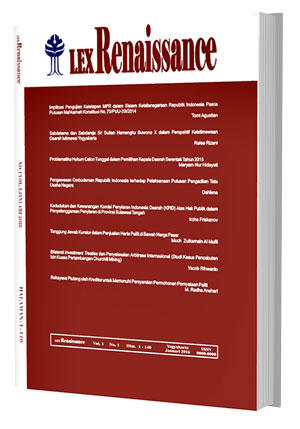Main Article Content
Abstract
The background of this research is the guarantee of recognition of the existence of the village through the formation of Law Number 6 of 2014 on Villages (Village Law). The Village Government has a strategic role and position in public services and empowerment of the community. Therefore, in order to empower the community and carry out service functions, the village must be empowered in any sector, one of which is the village financial management. This research will answer the formulation of the problem regarding what is the benchmark in the success of the village financial management in terms of village-related laws and regulations so that a prosperous and independent society is created? This is a normative juridical research with a statutory regulatory approach. The results of the study concluded that the affirmative policy of Law Number 6 of 2014 on Villages has a positive effect on the effectiveness of village governance. This is shown by the increase in the effectiveness of Village government organizations and the effectiveness of village deliberations. In terms of economic independence, efforts to strengthen village financing capacity can be seen from the widening of access to funding resources. The opportunity to empower the village can be made more possible through the empowerment of village-owned enterprises and village cooperation with other villages and / or cooperation with third parties.
Keywords
Article Details
Authors who publish with this journal agree to the following terms:
a. Authors retain copyright and grant the journal right of first publication with the work simultaneously licensed under a Creative Commons Attribution License that allows others to share the work with an acknowledgement of the work's authorship and initial publication in this journal.
b. Authors are able to enter into separate, additional contractual arrangements for the non-exclusive distribution of the journal's published version of the work (e.g., post it to an institutional repository or publish it in a book), with an acknowledgement of its initial publication in this journal.
c. Authors are permitted and encouraged to post their work online (e.g., in institutional repositories or on their website) prior to and during the submission process, as it can lead to productive exchanges, as well as earlier and greater citation of published work (See The Effect of Open Access).References
- Buku
- Conyers, Perencanaan Sosial Di Dunia Ketiga Suatu Pengantar, Gadjah Mada University Pers, Yogyakarta, 1991.
- Fadli, Moh., Jazim Hamidi, Mustafa Lutfi, Pembentukan Peraturan Desa Partisipatif (Head to A Good Village Governance).
- Ihsan, M. Mustofa., Ketahanan Masyarakat Desa, Kementerian Desa Pembangunan Daerah Tertinggal dan Transmigrasi Republik Indonesia, Jakarta, 2015.
- K, Effendy, Pergeseran Kepemimpinan Desa: Kharismatik, Paternalistik, Otokratik, Demokratik, Indra Prahasta, Bandung, 2012.
- Mardiasmo, Analisis Laporan Keuangan Daerah, Yogyakarta, YKPN.
- Nain, Umar, Relasi Pemerintah Desa Dan Supradesa Dalam Perencanaan dan Penggaran Desa, Pustaka Pelajar, Yogyakarta, 2017.
- Martosoewignjo, Sri Soemantri, Sistem-Sistem Pemerintahan Negara-Negara ASEAN, Tarsito, Bandung, 1976.
- Riyadi dan Bratakusumah, Perencanaan Pembangunan Daerah, Gramedia Pustaka Utama, Jakarta, 2004.
- Soleh, Chabib, dan Heru Rochmansjah, Pengelolaan Keuangan Desa, Fokus Media, Bandung, 2014.
- Widjaja, HAW., Otonomi Desa, Raja Grafindo Indonesia, Jakarta, 2012.
- Lain-lain
- Undang-undang Nomor 6 Tahun 2014 tentang Desa.
- Peraturan Dalam Negeri Nomor 20 tahun 2018 tentang Pengelolaan Keuangan Desa.
References
Buku
Conyers, Perencanaan Sosial Di Dunia Ketiga Suatu Pengantar, Gadjah Mada University Pers, Yogyakarta, 1991.
Fadli, Moh., Jazim Hamidi, Mustafa Lutfi, Pembentukan Peraturan Desa Partisipatif (Head to A Good Village Governance).
Ihsan, M. Mustofa., Ketahanan Masyarakat Desa, Kementerian Desa Pembangunan Daerah Tertinggal dan Transmigrasi Republik Indonesia, Jakarta, 2015.
K, Effendy, Pergeseran Kepemimpinan Desa: Kharismatik, Paternalistik, Otokratik, Demokratik, Indra Prahasta, Bandung, 2012.
Mardiasmo, Analisis Laporan Keuangan Daerah, Yogyakarta, YKPN.
Nain, Umar, Relasi Pemerintah Desa Dan Supradesa Dalam Perencanaan dan Penggaran Desa, Pustaka Pelajar, Yogyakarta, 2017.
Martosoewignjo, Sri Soemantri, Sistem-Sistem Pemerintahan Negara-Negara ASEAN, Tarsito, Bandung, 1976.
Riyadi dan Bratakusumah, Perencanaan Pembangunan Daerah, Gramedia Pustaka Utama, Jakarta, 2004.
Soleh, Chabib, dan Heru Rochmansjah, Pengelolaan Keuangan Desa, Fokus Media, Bandung, 2014.
Widjaja, HAW., Otonomi Desa, Raja Grafindo Indonesia, Jakarta, 2012.
Lain-lain
Undang-undang Nomor 6 Tahun 2014 tentang Desa.
Peraturan Dalam Negeri Nomor 20 tahun 2018 tentang Pengelolaan Keuangan Desa.




